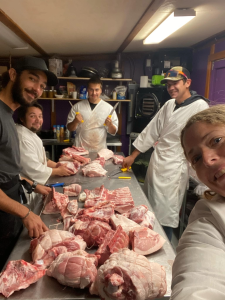At kilometre 699 of Yukon’s Klondike Highway, not far south of Dawson City, there’s a teaching farm established and administered by Trʼondëk Hwëchʼin First Nation. Goats, rabbits, pigs, chickens and ducks are among the animals living there. In the summertime, rows of vegetables thrive in the soil, supplementing those growing in greenhouses year-round.
Community members can enjoy the farm’s nutrient-rich, organic products for a relatively low price, or sometimes even for free. This helps them rely less on costly foods transported from far away.
Recently, with financial support from Food Banks Canada and the generous partners that contribute to its Northern Capacity Fund, Trʼondëk Hwëchʼin First Nation bought butchering tools for the teaching farm. The community gets moose-meat donations from local outfitters, but these must be quickly butchered and preserved before they spoil.
“The new equipment has given us the capacity to process meat more effectively,” says a report from Derrick Hastings, who manages the farm. “This allows us to accept more donations. We’ve been able to host workshops where we’ve taught butchering to young farmers and engaged citizens. We’ve butchered moose meat for elders and families, which is important because some elders cannot butcher meat anymore and really appreciate having traditional foods as part of their diet.”
Trʼondëk Hwëchʼin Farm has also used Food Banks Canada grants to purchase a manure spreader, which has increased their yield of vegetables, and a refrigerated van that allows them to safely transport meat and veggies to local services such as school nutrition programs, a men’s shelter and meals on wheels. “Supporting the farm to become a hub for learning and food distribution is the perfect example of a community sustainability initiative,” writes Hastings.

Collaboratively Supported, Locally Led
Initiatives such as Trʼondëk Hwëchʼin Farm are critical in the territories, where over a third of people live in a household that experiences food insecurity, according to Statistics Canada’s latest Canadian Income Survey. In Nunavut, that figure rises to a staggering 58%. Many communities face crisis-level hunger, magnified by geography, extremely high grocery costs and historical inequities.
Food Banks Canada is dedicated to being a valuable partner in addressing food insecurity in this disproportionately affected region. As one aspect of this commitment, our Northern Program staffers help to make Northern communities and organizations aware of the financial support available to them through Food Banks Canada’s granting programs, including the Northern Capacity Fund, which invests exclusively in their region.
Last fiscal year, this flexible fund distributed $2.5 million, empowering 42 projects and organizations to acquire the infrastructure they needed to improve and expand their services. During the same period, other Food Banks Canada grant programs invested in another 60 projects and organizations located in the North.
This wouldn’t have been possible without Food Banks Canada donors that include Enterprise Mobility, The Rossy Foundation and the Walmart Foundation. Their investments are enabling Northern communities to build sustainable, tailored solutions that include traditional hunting and harvesting activities, elder nutrition programs, food banks and more.
As an example of the Northern Capacity Fund’s impact, Manning and Area Food Bank Society received a grant that allowed them to continue their well-appreciated Community Kitchen Program in Northern Alberta.
“One participant was so pleased to be able to take home six meals to feed herself, her husband and their children at the end of the session,” the organization reported back to Food Banks Canada. “Her family plants a large garden every year but storing the produce has always been an issue. She took the dehydrating class, and because the food bank has two large dehydrators that can be loaned out, she borrowed one and took advantage of what she learned. Now she has a lot of dehydrated food that is easy to store and that will last the whole winter.”
Another grant recipient, the Hamlet of Arviat in Nunavut, started a breakfast-hamper initiative to cover the weeks of the year when the local school breakfast program was closed. “With our community fighting food insecurity every day, we were proud to be able to distribute food to every single child without leaving anyone out,” they reported. “We hope to foster a future where no child has to go without the nutrition they need to thrive. We’re deeply grateful to the granting organization, our local partners, our volunteers, and the donors whose ongoing support makes this work possible.”